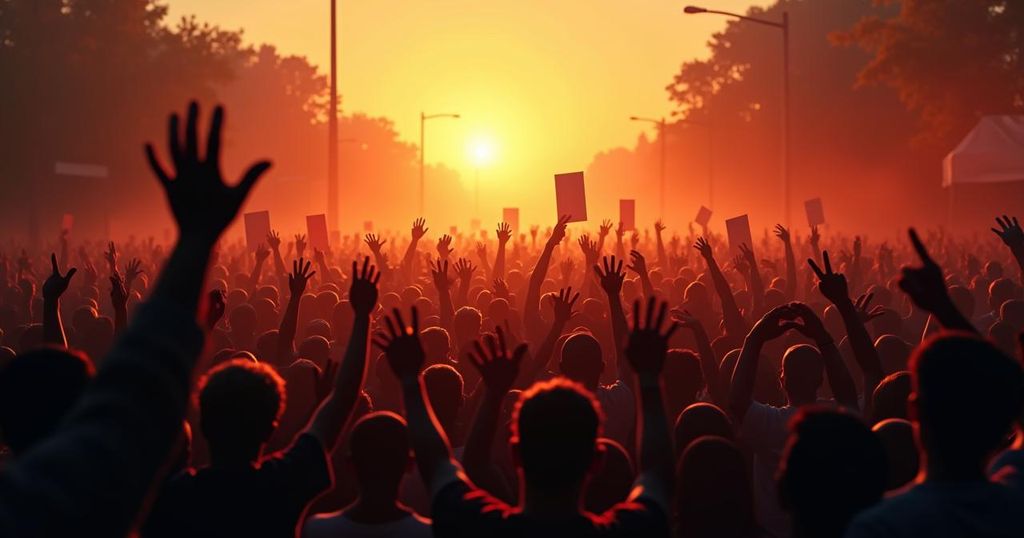Small opposition protests took place in Venezuela to dispute President Nicolas Maduro’s claimed victory in the July election. Maria Corina Machado urged smaller gatherings to evade crackdowns. Demonstrators, including notable activists, expressed fears of repression while calling for recognition of fraud. International pressure mounts for dialogue and a transition towards democracy.
On Saturday, small groups of opposition protesters gathered in Venezuela to contest President Nicolas Maduro’s assertion of victory in the disputed presidential election held on July 28. This rally coincided with the two-month anniversary of the election results, which are deemed fraudulent by opposition leaders. Maria Corina Machado, a prominent opposition figure currently in hiding, called for these smaller protests as a strategy to evade government crackdowns witnessed during earlier demonstrations. Approximately thirty individuals congregated in a plaza in Caracas, voicing their dissent against Maduro’s regime. Among them was Leida Brito, affectionately known as the “Red Helmet Grandmother” due to her longstanding anti-government efforts, who proclaimed, “Nicolas Maduro should leave because he lost,” while holding a sign stating, “To defend the vote is a right.” Another protester, retired Colonel Hidalgo Valero, expressed concern for public safety, stating, “The freedom of Venezuela is in danger. Today our people are afraid to be in the streets because there is tremendous repression.” Machado communicated a message of resilience to her supporters via a voice note, asserting, “Here we are standing firm, advancing every day with more strength and enthusiasm.” Following the election, a series of arrests targeted opposition leaders and more than 2,400 citizens accused of terrorism related to protests, resulting in twenty-seven fatalities during the unrest. The opposition claims that its candidate, Edmundo Gonzalez Urrutia, won with 67% of the votes based on their own tallies from polling stations, contrary to the National Electoral Council’s announcement of Maduro as the victor with 52%. Gonzalez Urrutia has since sought asylum in Spain after entering hiding last month. Internationally, larger protests drew supporters in cities such as Mexico City, Buenos Aires, Panama City, Montevideo, and Madrid, where Gonzalez Urrutia acknowledged his followers waving Venezuelan flags from the diaspora. In response, Maduro addressed a gathering of his supporters in Caracas, derogatorily referencing Machado as the “supposed queen bee,” and dismissed her departure by stating, “We are not in Madrid, we are not hiding, we are in the street.” On the diplomatic front, a coalition of around thirty nations, led by the United States and Argentina, urged Maduro to initiate dialogue with opposition representatives, calling for “constructive and inclusive discussions on a democratic transition” and demanding the immediate release of those detained following the election.
The political landscape in Venezuela has been tumultuous, particularly after the controversial presidential election in July, where President Nicolas Maduro claimed victory amidst widespread allegations of electoral fraud. The opposition, led by various figures including Maria Corina Machado and Edmundo Gonzalez Urrutia, has contested these results, asserting their candidate won a significant majority. The tension has resulted in civil unrest, with numerous protests leading to state repression and arrests. The international community has taken notice, with calls for dialogue and democratic transition being voiced from various countries, pointing to the escalating crisis within Venezuela.
In summary, the ongoing protest actions in Venezuela reflect widespread discontent with the electoral process that has favored President Nicolas Maduro. The opposition continues to rally for recognition of their claims, as evidenced by gatherings in Caracas and global demonstrations. Amidst state repression and arrests, the international community is increasingly advocating for dialogue and democratic reforms, highlighting the urgent need to address the political crisis in Venezuela.
Original Source: www.voanews.com







